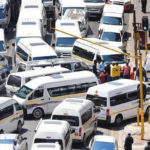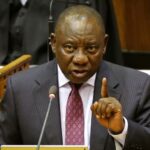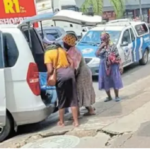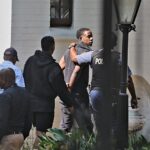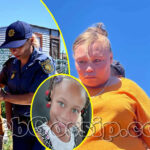Pretoria – The remains of the 14 South African National Defence Force (SANDF) soldiers who tragically lost their lives in the Democratic Republic of Congo (DRC) late last month have finally been repatriated, arriving back on South African soil on Wednesday evening.
The handover ceremony to their grieving families will take place this evening at Air Force Mobile Deployment Wing (formerly Air Force Base Swartkop) in Centurion, followed by a memorial service.
The soldiers were part of the Southern African Development Community Mission in the Democratic Republic of Congo (SAMIDRC), and the United Nations mission (Monusco), which aims to help restore peace, security, and stability in Africa’s second-largest country. They were killed in action against the M23 rebel group during intense fighting in the Goma region of North Kivu province, which escalated between 23 and 27 January.
The SANDF expressed condolences to the families of the soldiers who died. The members were hailed as heroes by President Ramaphosa during his State of the Nation Address.
The 14 fallen soldiers are:
- Staff Sergeant William Eddie Cola
- Staff Sergeant Molahlehi Ishmael Molahlehi
- Staff Sergeant Shwahlane Theophilus Seepe
- Corporal Matome Justice Malesa
- Corporal Rinae Nemavhulani
- Lance Bombardier Itumeleng Macdonald Moreo
- Lance Corporal Tseke Moffat Molapo
- Lance Corporal Metse Stansly Raswiswi
- Rifleman Sebatane Richard Chokoe
- Rifleman Derrick Maluleke
- Rifleman Tshidiso Andries Mabele
- Rifleman Calvin Louis Moagi
- Rifleman Mokete Joseph Mobe
- Private Peter Jacobus Strydom
President Cyril Ramaphosa is expected to attend the memorial service and handover ceremony this evening. During the recent State of the Nation Address, Ramaphosa paid tribute to the fallen soldiers and instructed the South African national flag to be flown at half mass from Friday, 7 February, for a week.
African Defence Review Director Darren Olivier called the rescheduling of the handover from this morning to this evening “an insult to the families, a middle finger to the TV and radio stations who made plans for the live broadcast, and yet another broken promise in a series of poorly communicated delays, showing little respect for the sombre task of bringing home SA’s fallen. It’s shameful.”
The Economic Freedom Fighters (EFF) also criticised the “entirely unrealistic promises” by the Chief of the SANDF, General Rudzani Maphwanya, that the bodies would be returned on 5 February. “This was an entirely impossible promise for the sake of cheap propaganda to try and deflect from the serious mismanagement of the SANDF deployment in the DRC,” the party said.
“The expectations that this callous promise raised for the families of the 14 departed soldiers meant eight days of forlorn hope and agony, that only added to their already deeply inflicted pain and loss. Furthermore, the EFF strongly condemns the last-minute postponement of the formal handover of the remains of the deceased soldiers, which was originally scheduled for this morning at Swartkop Air Force Base.”
The EFF called this “blatant disrespect towards the bereaved families” as being “utterly unacceptable. The President’s SONA engagement was well known in advance, raising the question—why was the initial handover scheduled for a time when he was unavailable, only to be changed again after families have already endured unjust delays? The continued lack of urgency and sensitivity in handling this matter is a disgrace, and the EFF stands in solidarity with the affected families who deserve dignity, respect, and closure.”
The EFF also pointed out that the fact that the 14 soldiers arrived aboard a Tanzanian aircraft is an indication of the “pitiful state” of the South African Air Force, which does not have serviceable aircraft in its fleet that could have carried out this flight.
“The EFF reiterates our call for President Cyril Ramaphosa to now ensure that all our wounded soldiers, who are still in the DRC, are expeditiously returned to South Africa for full and adequate medical care. Their return must be followed by the withdrawal of all our soldiers from the DRC, as a matter of urgency.”
South African troops, including serving with Monusco, are also stationed in Beni, some 350 km from Goma, and they are unaffected by developments around Goma. The SANDF appears to be sending reinforcements to the region, with multiple chartered Il-76 transports flying from Pretoria. Apparently some 800 additional troops have been sent to the region.
In a debate in Parliament on the DRC issue on Monday, members of parliament were both for and against the SANDF deployment. Some said it was an important part of the African Union’s 2063 Agenda, which seeks to establish peace, stability and prosperity to create the “Africa We Want”. However, others participating in the debate criticised the SANDF’s presence in the region, which they characterised as one of the most politically explosive regions on the African continent. They also criticised the SANDF’s lack of equipment and poor planning.
“Our soldiers didn’t die in defence of the defenceless, as claimed by the President. They were part of a not-well-planned peace-keeping mission. They were thrown into battle ill-equipped, underfunded,” said Christian Hattingh (DA), who proposed the motion for debate. “Our soldiers fought against well-equipped and well-trained M23 rebels; our government sent them to war unprepared.”
Hattingh called for accountability for this human calamity. In his view, the lack of accountability for the operational failure that led to human losses speaks to wide issues related to governance and leadership within the army. “The President and the Minister must be held accountable for failure to prioritise the safety and effectiveness of our troops,” he stated.
Also participating in the debate, the Chairperson of the Portfolio Committee on Defence, Malusi Gigaba (ANC), supported the deployment of troops as part of the African Union’s 2063 Agenda. He proposed instead to hold a debate on South Africa’s role in safeguarding the wellbeing of all of Africa.
The DRC, like many other countries in Africa, is one of South Africa’s strategic allies and should remain so, said Mzikayise Ntshingila (MKP). He emphasised that there is nothing wrong with SANDF’s participation in peace-keeping missions in Africa but troops should be equipped with the proper military support and capacity, which the current government failed to provide.
Meanwhile, Julius Malema (EFF) called for the immediate recall of all South African troops, as South Africa cannot afford to lose any more lives. He alleged that the government had lied to South Africans when it deployed troops in the DRC. “This mission was presented to us as a peace-keeping mission. The truth is that our soldiers are not there to maintain peace. They are engaged in direct combat and are fighting against highly armed and strategically superior M23 rebels that are reckless,” Malema said.
“While these rebels had advance weaponry, our soldiers were sent there without drones, fighter jets and critical military assets,” he continued. “Our soldiers were left vulnerable because of the failures of this government.”
This view was shared by Songezo Zibi (Rise Mzansi), who claimed that the tragedy was the responsibility of successive Parliaments that approved the SANDF budget cuts that placed soldiers’ lives in danger. “We can’t keep on sending our army with knives to a gun fight,” he asserted.
Mmusi Maimane (BOSA) pondered whether, given the state of South Africa’s army, “… if these were our children, would we have sent them to the DRC?” He continued: “Let’s bring our troops home. We have no business in the DRC because we have no fiscal room to sustain their presence there.”
The Minister of Defence, Angie Motshekga (ANC), urged the critics to consider the SANDF’s role in the region in the context of South Africa’s foreign policy in Africa. “Since 1994, we adopted a foreign policy that seeks to contribute to peace and stability on the continent. To date, we have participated in 23 missions with UN [United Nations], AU and SADC [Southern African Develoopment Community] in various African countries,” she explained.
Mpumalanga residents have expressed concerns about the safety of the remaining South African National Defence Force (SANDF) soldiers in the Democratic Republic of Congo (DRC).
This is as the SANDF has confirmed that the mortal remains of the 14 soldiers killed in the eastern DRC have arrived in the country.
The residents are calling for the withdrawal of South African troops from their deployment in the DRC.
Some residents have offered their condolences, while others are questioning the presence of South African soldiers in that country.
“We would like to convey our condolences for the soldiers who have passed on although we really don’t know why they were there and their children have lost a parent and will suffer”, says one of the residents.
Another resident says, “We’ve got neighbours and friends who are soldiers and we don’t know where they are deployed. They haven’t returned home since this tragedy happened.”
“They died over there and they have been postponing the return of their bodies back home. We don’t know what their purpose in the DRC was, but we think they were there to protect the assets of the politicians.”
Meanwhile in the Free State, the community of Botshabelo is devastated by the death of SANDF soldier, Mokete Mothupi.
Botshabelo activist Ramajoko Mothupi has described Mothupi as a committed soldier who loved his community and family.
“I have mixed feelings about this. To lose someone is very painful, but you must also understand that we must also be proud that our township continues to produce men and women who are ready to work or ready to fight for peace because if we don’t have peace in the continent, no country will have peace. So, he died in the battle line where he was fighting for peace. “

Follow Us on Twitter



